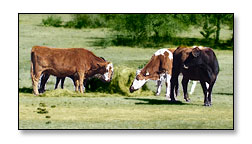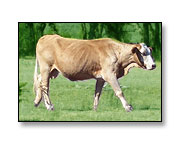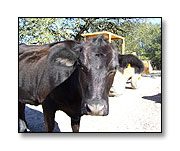Health and Environment At Red Barn Beef we care about the environment and the future. We offer meat produced with humane, sustainable, and natural methods for the benefit of ourselves and our neighbors. We love the animals, the land, and our work.
At Red Barn Beef we care about the environment and the future. We offer meat produced with humane, sustainable, and natural methods for the benefit of ourselves and our neighbors. We love the animals, the land, and our work.
Our Practices
- The cows are fed natural growing grasses. The supplemental winter hay is fertilized high protein Bermuda or Klein grass grown nearby. The animals are moved regularly to "paddocks" (small grazing area) to assure the grass is not overly utilized and the animals get a variety of nutrients. Water is supplied from a rain-water system and, when necessary, a 500 foot well.
- Mineral supplements (trace minerals) are supplied through natural mined minerals and sea weed kelp (which has a wide variety of minerals easily assimilated). The cows/calves are offered the mixture "free-choice".
- Cattle have plenty of room to roam with lots of shade trees for rest.
- No growth hormones are ever used.
- When calves are at their prime they are transported about 15 miles in our small trailer to the USDA certified butcher and meat processing plant in Johnson City. The facility is clean, well lit and ventilated. The workers are relaxed and well trained which means less stress and more humane treatment for the animals.
- The meat is aged approximately 14 days which increases tenderness. It is then cut to proper portions, flash frozen and vacuum packed. The packaging ensures meat which can be stored for up to one year without loss of flavor ("no freezer burn").
- Because the calves are harvested prior to 24 months we get the best animals and tender meat that can be enjoyed.
- Selective breeding ensures the best genetics for tender well-flavored meat. We ear tag our calves and cows for easy identification and tracking. We sonogramed our Registered Brangus Bull "PR" to ensure genetic tenderness qualities.
- We use no animal by-product feed stuff or routine antibiotics. (In the event an animal is injured or ill, veterinary prescribed antibiotics, massive dosages of Vitamin C and B are administered and the animal is pulled from production).
- The animals are fed alfalfa cubes from time to time. They are used to bring the cows in for "working" (checking the cattle regularly for identification, injury or health problems, and to keep them calm and familiar with us.)
- Insect control is accomplished with a combination of Diatomaceous Earth (DE), pyrethrum (organic chrysanthemums), citronella (like mosquito repellent) and basic H (a Shaklee soap product which has no harsh chemicals but makes an unfriendly environment for flies and worms).
Our cows are happy cows.

We raise open range, grass-fed cattle in a humane and sustainable manner.
Why Not Corn Fed?

A high grain diet can cause physical problems for ruminants - cud chewers like cattle. Ruminants are built to eat fibrous grasses - not starchy low-fiber grain. This switch to grain can cause a number of disorders including sub acute acidosis. This condition can cause cattle to be agitated, go off their feed and get highly stressed. Ultimately, this condition can affect quality of life for the animal and, when fed to humans, affect the meat.
|

